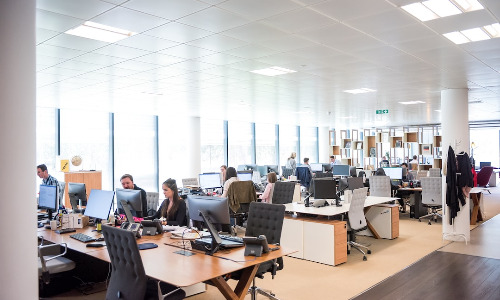
Unispace Warns Future Talent Will Suffer if Return to Office Debate Continues
A global workplace creation expert, Unispace, has issued a warning that the younger generation will be impacted if the ‘return to the office’ battle between staff and employers is not resolved soon. Responding to statistics from TravelPerk, which revealed that 58% of employees believe in-person meetings are important, the company’s data revealed a similar trend in workers valuing the office as a place to collaborate, with 79% of the 3,000 employees surveyed revealing that they missed the social aspect of the office when working from home. A further 75% stated they would be happier to be in the workplace if they knew their peers would also be with them.
However, according to Unispace, it is the emerging generation that both value the benefits of in-person collaboration and actively seek it in their role. The company’s study revealed that 81% of those in the 18-34 age group feel disconnected from colleagues in a remote environment. As Lawrence Mohiuddine, CEO, EMEA at Unispace, explained, with data suggesting that younger generations have a need for in-office collaboration, a resolution to the current battle between employers and employees is needed: “The debate around the return to the office and the apparent struggle between staff and business leaders is a top news item at the moment, however it is often overlooked that employees do still value the workplace. While flexibility may be the more widely adopted approach at the moment, that does not mean that the office is no longer needed and there is an ever-growing body of research to demonstrate this.
“What is perhaps being overlooked is just who is potentially missing out while the alleged power struggle continues, and that is our future talent pools. There is so much that cannot be taught to the emerging generation of the workforce in a rigid, virtual world. The tips and tricks of the trade picked up from overhearing more experienced peers in the office or handed down in passing conversations in the corridor are invaluable, and younger demographics recognize this.
“The tug of war between workers and employers that is being portrayed at the moment needs to be resolved – and soon – for the benefit of future talent. Whatever format this compromise takes, I fully believe the office will play a significant role.”
The COVID-19 pandemic has accelerated the trend of remote working, which has forced many businesses to adapt to a virtual workplace. While this has worked for many, there has been a growing trend of employees missing the social aspect of the office and the value of in-person collaboration. However, the debate between employers and employees over the return to the office has yet to be resolved.
According to Unispace, the younger generation will suffer the most if the current debate continues. The company’s study revealed that 81% of those in the 18-34 age group feel disconnected from colleagues in a remote environment. This is a significant issue as younger workers are the future of the workforce and will shape the direction of businesses for years to come.
As the CEO of Unispace, Lawrence Mohiuddine, explained, the tips and tricks of the trade that are picked up from more experienced peers in the office are invaluable and cannot be replicated in a virtual environment. This is particularly important for younger workers who are still learning and need to be exposed to experienced professionals to develop their skills.
While remote working has its advantages, the office still has an important role to play in the development of future talent. Therefore, the debate around the return to the office needs to be resolved for the benefit of future generations.
The pandemic has also highlighted the need for businesses to be more adaptable and flexible in their approach to the workplace. This has resulted in a growing trend of businesses adopting a hybrid approach to the workplace, where some working from home is permitted with several days being marked as being in-office for all. Only time will tell what will be successful for businesses and what will work for employees.


